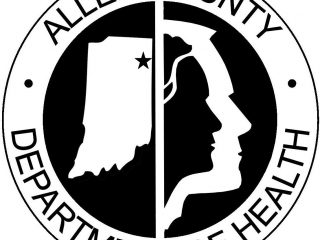
Serving Residents of Allen County
Though its name and services evolved over more than 150 years, the Allen County Department of Health has a storied history serving residents of Fort Wayne and its surrounding communities.
State of Indiana passes the enabling legislation allowing for the creation of the Fort Wayne Board of Public Health.
A mandatory 18-day quarantine is imposed for any pupil exposed to smallpox.
The first meat and milk licenses are issued. Milk merchants must declare the number of wagons used to deliver milk in Fort Wayne to obtain permits.
Rules for quarantining households are adopted.
Physicians are ordered to report all cases of influenza coming to clinics whether mild or severe to the Health Department. Schools are required to send every pupil or teacher with a severe cold, cough or sneezing to their doctor.
A health campaign to rid the city of rats was started, since the pests had "accumulated during past years when garbage collection was difficult due to war and manpower shortage."
A food & beverage ordinance was written and passed for greater consumer safety. A Water Cross Connection campaign was also developed due to increasing water pollution issues.
The city declares an emergency and is placed under a quarantine due to an ongoing rabies epidemic.
The polio epidemic is the worst in Fort Wayne history, with 45 cases and 5 deaths at that point.
A new Indiana law requires schools to report the disease immunization records for each student. The city and county health departments also begin to discuss a merger.
"... all health ordinances governing the operation of food establishments and food markets were revised and modernized in keeping with the technical and procedural advances which have been made in the food industry," an annual report says. "It is expected that these new health ordinances will result in the continual upgrading of sanitation levels in food establishments and food markets in the City of Fort Wayne."
A "fluorescent antibody microscopy unit and a new specialized microscope have been provided" to the department's Laboratory Division to assure "improved diagnostic procedures in many aspects of laboratory analyses."
U.S. Public Health Service designates the Fort Wayne Board of Public Health a Yellow Fever Vaccination Center, allowing area residents to receive immunization services for foreign travel.
The Board of Heath establishes a TB clinic at the Irene Byron Hospital.
The Health Department moves to the City-County Building (now Rousseau Center) in downtown Fort Wayne. A rodent control division is established and a commercial swimming pool and beach ordinance is adopted.
Rodent Control Team is formed and expanded to become a full-time division.
The public begins to demand spraying for mosquitoes with the emergence of St. Louis Encephalitis.
Parochial, private and public schools in Allen County take part in an in-school immunization effort in which thousands of vaccines are delivered.
The Vital Records Division begins using a computer terminal to better locate records stored on microfiche.
The Department is designated an HIV/AIDS Counseling and Testing Site
Food establishment inspection records become public information "by court order," according to an annual report
An increasing number of people request HIV antibody testing through the Fort Wayne-Allen County HIV Counseling and Testing Site
Allen County is designated one of three counties in the state to start Hepatitis B immunizations in infants
Health Department management is reorganized to include a health administrator, in addition to the existing health commissioner, to better serve the community. Loren Robertson serves as the first health administrator.

